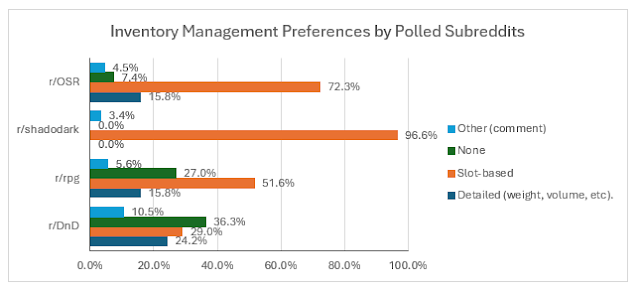A View on Inventory Management Methods Across Gaming Groups
Inventory Management Methods - Poll Results
Recently, I have been testing parts of a table-top role-playing game (TTRPG) system that I'm developing by running a dungeon of mine (Pyramids of the Death Worshippers). This has been incredibly helpful by allowing me to see mechanics in action from different angles. One of those mechanics is slot-based inventory management.
As many other TTRPGs, inventory management is a central part of my game. In my opinion, having a finite number of carrying capacity can set interesting challenges, from having enough rope to being able to carry all of the treasure you just found. There are various methods of managing inventory in TTRPGs, and ultimately it comes down to preference. Yet, it got me thinking about what method different groups are implementing.
To get an idea, I ran four polls across TTRPG subreddits, including r/OSR, r/Shadowdark, r/RPG, and r/DnD (herein referred to as OSR, Shadowdark, RPG, and DnD, respectively). A table with the raw counts and a description of the methods can be found at the bottom of this post. The results are quite interesting and are summarized below:
Immediately, we can see that 3 out of 4 subreddits prefer slot-based inventory. Two of these groups overwhelmingly preferred slot-based: Shadowdark with 96.6% (85/88), and OSR with 72.3% (334/462) of responders. Over at RPG, a little over 50% (111/215) of responders preferred slot-based. This may be expected based on the systems that typically circulate amongst these groups. Obviously, Shadowdark is a subreddit for a singular system that spells out rules for slot-based, whereas OSR can cover a wide range of systems. With that said, it appears that Shadowdark users are comfortable with the slot-based method as only a few prefer other (3.4%; 3/88). OSR results are interesting because a wide variety of systems circulate the OSR subreddit (e.g., Old-School Essentials, Cairn, Mork-Borg, Black Hack, Mothership, I could go on forever) and I expected it to have a more even distribution. The fact that slot-based was a great proportion (>70%) of the responses could give us insight into a few things. For example, it is possible that most systems in the OSR, or at least the most popular at the moment, use slot-based, or maybe most users simply change the rules to use slot-based. Further polling would be necessary to ascertain these possibilities.Interestingly, the most even set of responses came from DnD. Here, None, Slot-based, and Detailed all had a similar number of points (36.3%, 29.0%, and 24.2%, respectively). None was still highest, suggesting that most people playing DnD (likely 5e) forego inventory management. Those that retain inventory management appear to either simplify it with slot-based or stick with the rules and use a detailed (weight-based) method.
All groups showed a low percentage of responders that prefer Other. This could be due to the nature of limited choices, e.g., most games re-use a select few methods, or due to the dominating popularity of a select few methods. Based on comment responses, Other methods include, e.g., but not limited to,
- Quantum inventory, wherein characters have necessary equipment when needed or spend an in-game resource to have said equipment (see, e.g., Fabula Ultima);
- Abstracted weight, wherein items are given a score and said score counts towards a maximum carrying capacity (see e.g., Resident Evil, Dungeon World, Pathfinder 2e, or the stone-based system by Delta);
- Unlimited carry, wherein characters have a means of unlimited storage, e.g., a magic item such as the famous bag of holding; and,
- Reasonable expectations, wherein the game master or players manage inventory based on what they deem fair.





Comments
Post a Comment